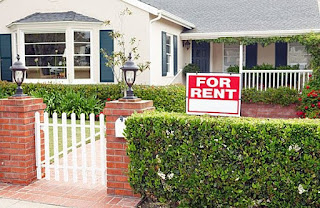 Sure, buying and owning a home has its share of issues and concerns. But so does renting.
Sure, buying and owning a home has its share of issues and concerns. But so does renting.First there's the down payment and closing costs to muster. Then there's the property tax hit. And maintaining a residence isn't cheap. When it's time to move, "pick up and go" is hardly a feasible option.
But the rewards, in most cases, make those drawbacks seem like minor inconveniences.
Here are six significant reasons to grab that hefty piece of the ownership data pie:
1. Tax deductions: Although they're the stuff that bill-paying grumbles are made of, mortgage interest and property tax obligations are a homeowner's best friend come tax time.
2. Appreciation: We're talking about the financial kind. Homes are considered a safe, steady investment, with values that rise while debt amount drops. Studies completed by RE/MAX show that the average price of a home in Canada increased between 3.6 and 6.1 per cent in the fourth quarter of 2019. While 2019 was a very strong year for price growth, over the past five years, including the recessionary period, Canada's average home prices have grown on average by 3.5 per cent compounded annually showing that the national median home price is a consistent grower, even during recessions and periods of sales declines. Typically, you can expect to see property gains after a minimum of 5 years of ownership but there is a distinct correlation between an increase in the rate of return on the property and the longer the time period that the property is held. For example, a buyer who makes a 10 percent cash down payment with an annual home appreciation rate of 5 percent could expect a 94 percent return on the cash after three years of home ownership. After five years, the return increases to 225 percent, and after 10 years, a whopping 623 percent.
3. Equity: The portion of property that's actually owned, or equity, also increases over time so owning a home will allow you to build the equity that accompanies appreciation. "You can't build equity if you are a renter." said Cathy of Bradford, Ontario. "Before we found rent-to-own, we were trapped in that cycle of paying rent to landlords. We did that for nine years before we finally decided it was time to own something. Unfortunately we did not qualify for our own mortgage at that time but we are a year away from the end of our program and are very confident that we will qualify for our own mortgage."she says. "Nine years of rent. I shudder when I think about how many tens of thousands of dollars that was for properties we had no stake in? Our landlords were very happy, that's for sure. What a waste!" Since 2010, Cathy and her husband, James, have been paying themselves instead. Their home, purchased in 2010, has appreciated by about 10 percent since then. What's more, a first home often leads to a better second home. Equity buildup and appreciation in a first home help in the transition to a second.
4. Borrowing power: For owners who opt to stay put, equity still comes in handy. It can be used to secure a loan or obtain a line of credit, meaning that you will have more buying power to fund home improvements or to assist with the purchasing of investment property.
5. Stability: Renters generally have no idea what they'll be paying a few years down the line. Home owners with fixed-rate mortgages or people in a rent-to-own will essentially have the same payment, at lease for the duration of their mortgage or rent-to-own program. Forget about worrying whether or not your landlord is going to renew your lease or decide to kick you out so he can sell or move back in. You become your own landlord when you own and your only focus should be on making your payments on time (either on a mortgage or into a rent-to-own program). Other people find stability in being anchored to the community which includes not having to worry about uprooting your family from the area or from local schools to move on to the next rental.
6. Freedom: Want or need to make noise? Practicing those drums? Kids joined up for band in school? Making noise in your home is also much easier when you own it. No need to worry about your noise disturbing the downstairs or upstairs neighbors. Are you handy? Love to decorate and make your "place" your own? All decisions regarding style, decoration and upgrades are yours when you own or rent-to-own. You get complete decision-making autonomy. Lime green paint in the kitchen? Go ahead. Red in the bathroom? Sure. The days of being fined for damages to the walls are behind you. Home ownership (traditional mortgage or rent-to-own) allows you the opportunity to put down roots. Just like you can plant a tree and watch it grow, you can plant a family and watch it blossom.

